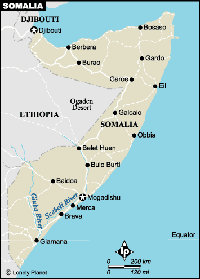UN appeals for US$326.7 million for Somalia
The U.N. appealed Tuesday for US$326.7 million ( Ђ 268.36 million) for some 2.1 million people hit by severe food shortages in southern Somalia after the worst drought in a decade.

Victims include 710,000 people facing an acute food and livelihood crisis, 915,000 hit by a humanitarian emergency and up to 400,000 people who fled their homes to escape violence in this anarchic country, according to the United Nations Office for the Coordination of Humanitarian Affairs.
"This current drought is unprecedented in 10 years, and the impact it is having on food, water, health, education and livelihoods is alarming," said U.N.'s Acting Humanitarian Coordinator for Somalia Christian Balslev-Olesen.
"With a rapidly deteriorating humanitarian situation, the humanitarian community needs to scale up its current response exponentially," he said in a statement.
Somalia has not had an effective central government since opposition leaders ousted longtime dictator Mohamed Siad Barre in 1991. They then turned on each other, carving the nation into a patchwork of clan-based fiefdoms.
Since then, persistent local conflicts have eroded Somali livelihoods. Infant, child and maternal mortality rates are among the highest in the world. Displacement, prolonged drought, flooding and human rights abuses have all contributed to the current humanitarian crises, according to the U.N.
"Nearly 2.1 million people are in urgent need of assistance, this is a race against the clock to stem the tide of human misery," Balslev-Olesen said.
More food and water was needed, as well as medicines to prevent a measles outbreak and curb the spread of polio in the region, he said.
The drought has tipped the balance in many highly impoverished border areas where Somalia, Ethiopia, Djibouti and Kenya meet. The United Nations says more than 11.5 million people will require food assistance in the next six months, reports the AP.
I.L.
Subscribe to Pravda.Ru Telegram channel, Facebook, RSS!




